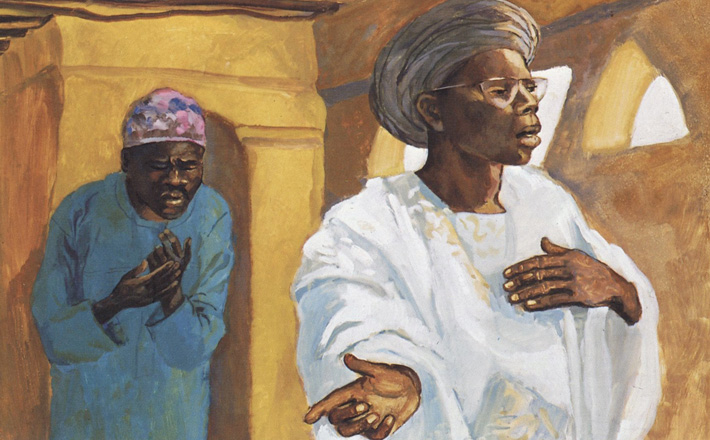Commentary on 2 Timothy 4:6-8, 16-18
Payback — it’s one of the dominant themes in art and narrative.
It springs from some place deep in our social sensibilities. The consequences of certain kinds of behavior, we believe, are fully warranted. Some actions deserve reward, while others bring retribution. Payback is part of how we comprehend justice, whether actual or poetic.
Many of us have been trained to understand the gospel of Jesus Christ as a state of affairs in which the rules of payback are obliterated or turned on their head. But much of the Bible doesn’t see it quite that way.
“The Lord” of the Ending
Consider the ending of Second Timothy, which refers to payback in connection to God’s final reckoning:
- Paul’s life nears its end. As that life is being poured out like a sacrificial drink offering to God (see Philippians 2:17 as well as Genesis 35:14; 2 Samuel 23:16; Jeremiah 7:18; and practices in Greco-Roman religion), and as he dies as one who has “kept the faith,” Paul awaits “the crown of righteousness.” (2 Timothy 4:6-8)
- Others, too, await this crown, others “who have longed for [Jesus’] appearing [epiphaneia; see also 1:10; 4:1],” not the first appearance (epiphany) in Galilee and Judea but the coming one. (4:8)
- Trouble awaits Alexander the coppersmith, who did bad things to Paul. (4:14)
- Paul worries about those who deserted him during his prosecution, that they might not finally be held accountable for their failure to stand with him. (4:16)
- Even the Lord can expect some payback, in a sense. The One who has brought Paul safe thus far deserves the ascription of “the glory forever and ever.” (4:18)
Admittedly, some of the above information does not appear in this Sunday’s lection, since verses 9-15 have been left out. While these missing verses do not add much theological substance, they do contribute considerable flair to the pathos of Paul’s farewell words. They depict Paul’s final days, as he perseveres more or less isolated in the face of death, as no picnic. Being deserted as an imprisoned person in antiquity could result in more than shame and increased legal jeopardy; it made it difficult for the incarcerated to eat and sleep properly in a world where no “prison system” existed to provide for basic needs. Friends were supposed to do that.
Notice, too, the repeated attention to “the Lord” in these verses:
- The Lord will give Paul and other believers the crown of righteousness. This reward is not Paul’s to seize. He didn’t earn it, necessarily; but his faithful service buttresses his confidence that the Lord will prove faithful in providing it to all who faithfully await his appearance. A confidence about future rewards — this is one more virtue commended to Timothy and others via Paul’s example.
- We assume Paul would credit the Lord for helping him complete the struggle and finish the race (2 Timothy 4:7; the focus is on completion, not “winning” either metaphorical “event”).
- The Lord will repay Alexander and perhaps the deserters.
- The Lord is the one who has accompanied, strengthened, and preserved Paul along the way.
- Finally, the glory belongs to the Lord.
Throughout the letter, Paul has been the example to imitate. But it has been the Lord who makes such faithfulness possible. The Lord makes perseverance a reality, let alone a desideratum. The people Timothy and Paul serve are not their own, but the Lord’s. The Lord possesses authority to issue rewards and punishments.
The ending of the letter therefore displays an interesting tension between, on one hand, its (or, Paul’s) desire to have friends rewarded and enemies penalized and, on the other hand, its convictions that the dispensing of payback belongs to God, by virtue of God’s power and right. The letter longs for faithful friends to receive benefits and for opponents and betrayers to get their due. But it cannot fully shed the understanding that any such recompense is God’s business alone.
The letter’s crisis tone nearly makes one assume that no one around Paul “back then” was able to remain faithful to God and Paul’s gospel — except for Paul himself. No wonder such importance hovers over the question of Timothy’s faithfulness. But when we look more closely, reading from the very beginning through the end of the letter, we see that maybe others were faithful, too: Lois, Eunice, Crescens, Titus, Luke, Mark, Tychicus, Carpus, Prisca, Aquila, Onesiphorus and his household, Erastus, Trophimus, Eubulus, Pudens, Linus, Claudia, and other brothers and sisters. That’s a church right there, probably enough to field two teams in the community softball league.
My point is this: despite Second Timothy’s propensity to paint a portrait of the departed apostle in heroic colors, it cannot do so without acknowledging God’s role in all of this. The immediate circumstances described in the letter suggest Paul was abandoned. The letter’s theological vision sees the opposite: accompaniment. The Lord Jesus Christ is all over the place.
“We Wish to See Jesus” (To Borrow a Line from John 12:21)
Preachers can work from Second Timothy to help congregations poke around in similar kinds of circumstances, for these are places where theology happens. Consider the landscape:
- When we yearn for (and when we fear) payback, we long for (and fear) justice to manifest itself. We also long for our own efforts to matter. Yet complete justice rarely comes, at least not at the speed we need it to arrive.
- Our efforts to serve God and neighbor, even the heroic ones, sometimes look and feel meaningless. After all, Paul’s actual death probably looked kind of sad and pathetic to those who saw it. How would anyone, even his closest associates, know for sure that anything he did really mattered?
- What do we make of the struggles of the church, that community of faith about whose future Second Timothy expresses so much concern? What can Christian communities do with their modest means and their often unreliable people?
Second Timothy directs our vision toward these kinds of circumstances and instructs us to see signs of the Lord in them. That’s theology, to name God’s presence in these and other places. And how we do theology matters: even the relentless confidence of this particular biblical book must finally admit that glory belongs to the Lord and that the Lord’s will — not necessarily the letter writer’s will — must be done. Such an admission commends humility and hope. That admission, finally, is the payback from us that God deserves, in our response to God’s slow yet certain faithfulness.


October 27, 2013